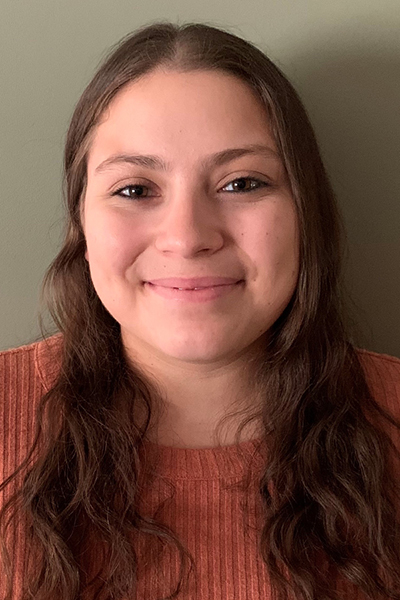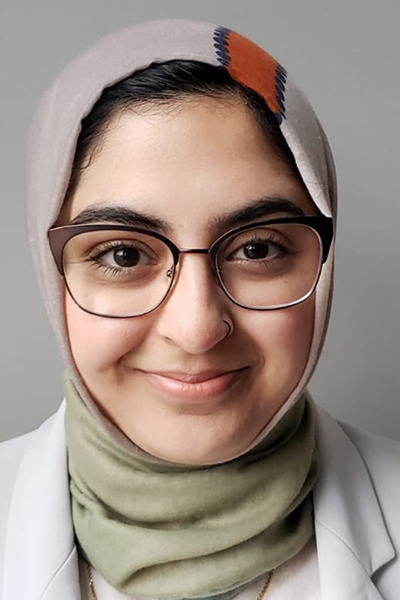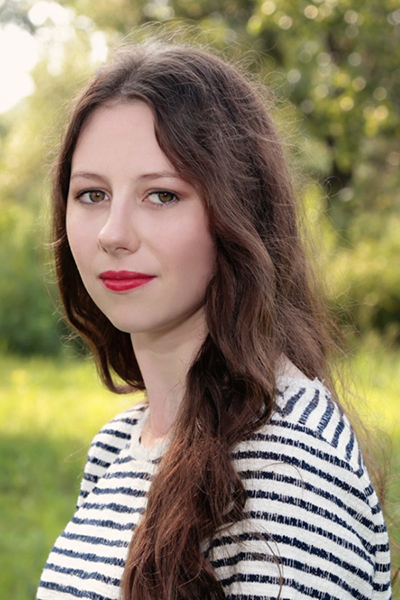 Lila Iriburiro Happy is one of six recipients of the Student Leadership Award for EDI in Research.
Lila Iriburiro Happy is one of six recipients of the Student Leadership Award for EDI in Research.
Making research more equitable, diverse, inclusive, and accessible is generational work. In May, the Office of Research and Innovation Services recognized students taking the lead on inclusive research practices through the Student Leadership Award for EDI in Research. Six scholarships of $500 each were awarded to undergraduate and graduate students. A selection of recipient profiles is included below.
 Master of Human Kinetics student Mikala Jones has a long history of working with individuals with developmental disabilities. During her undergraduate studies, she acquired volunteer experience working with children living with developmental disabilities at the John McGivney Children’s Centre. Her passion for helping others encouraged her to volunteer for the APEX (adapted physical exercise) program at the University of Windsor. Jones worked one-on-one with adults with developmental disabilities by taking them through their sport and exercise program with skill and sensitivity to their individual needs.
Master of Human Kinetics student Mikala Jones has a long history of working with individuals with developmental disabilities. During her undergraduate studies, she acquired volunteer experience working with children living with developmental disabilities at the John McGivney Children’s Centre. Her passion for helping others encouraged her to volunteer for the APEX (adapted physical exercise) program at the University of Windsor. Jones worked one-on-one with adults with developmental disabilities by taking them through their sport and exercise program with skill and sensitivity to their individual needs.
As the current APEX co-ordinator, Jones oversees recruitment, implements multiple three-month sessions each year, and communicates with community partners. Her research builds on APEX programming, with the objective to increase understanding of how quality volunteer experiences may enhance the effectiveness of community programming and increase the social inclusion of persons with developmental disabilities. This study can make important contributions to the fields of adapted physical exercise, disability, and sport for social change. Jones was nominated by professor Sean Horton.
 PhD candidate Ayesha Mian Akram’s activism and experience organizing on campus and in the community, as a Muslim feminist doing inter-faith work, working with Racialized Academics and Advocates Centering Equity and Solidarity (RAACES), and being a model and mentor to junior graduate students, inform and is deeply integrated with her dissertation and her dedication to serving the campus community. Her social justice orientation, commitment, and belief in individual activism and collective engagement for broader equity, diversity, inclusion, and decolonization transformation is demonstrated in her research. Her project involves working with other Muslim women activists to take on a community action and explore their relationship with their faith, community, and social justice. Her research and intellectual work are informed by and embedded in her experience and organizing for EDI goals and this experience informs the work that she does on campus and in her community.
PhD candidate Ayesha Mian Akram’s activism and experience organizing on campus and in the community, as a Muslim feminist doing inter-faith work, working with Racialized Academics and Advocates Centering Equity and Solidarity (RAACES), and being a model and mentor to junior graduate students, inform and is deeply integrated with her dissertation and her dedication to serving the campus community. Her social justice orientation, commitment, and belief in individual activism and collective engagement for broader equity, diversity, inclusion, and decolonization transformation is demonstrated in her research. Her project involves working with other Muslim women activists to take on a community action and explore their relationship with their faith, community, and social justice. Her research and intellectual work are informed by and embedded in her experience and organizing for EDI goals and this experience informs the work that she does on campus and in her community.
Through her research, Mian Akram works with precarious immigrant women workers and Black Africans experiencing racism in Windsor. She also volunteered with Friends of Women’s Studies when she first came to Windsor as one of the first concrete actions towards building her community. In addition to her studies, she is a sessional instructor in women’s and gender studies in the areas of social justice, race, and gender and encourages students to develop critical thinking skills and reflexivity both in and outside the class and is currently serving on the inaugural board of the Equity, Diversity, and Human Rights Awards Adjudication Committee as well as the Anti-Black Racism Implementation Oversight Team. Mian Akram was nominated by professor Jane Ku.
Lila Iriburiro Happy completed her undergraduate law and politics degree in May. Her campus and community engagement won her the Gold LEAD Scholar Medallion. Her intersectional research focuses on social justice, Black joy, geopolitics, Indigeneity, womanism, linguistics, and anti-colonization. Happy is an African-Diaspora woman with a unique positionality as a global citizen who is fluent in four languages and has lived in seven countries. As a justice seeker, She aspires to be a children rights defender, human rights lawyer, and judge with a focus on trauma-informed support in sexual violence prevention.
“Leadership is about the willingness to help and establish a precedent on equity,” says Happy. “My guiding philosophy is servant leadership, centering compassion and accessibility, to ensure everyone has the support and resources to thrive. Giving back is my action-oriented method to being an effective leader.”
Her research has been featured in the RAACES Review and the UWindsor EDID newsletter, and her term as president of the Windsor Model United Nations has inspired a passion for pro bono work. Happy was nominated by professor Eahab Elsaid and extends her thanks to him and to her mentors in RAACES, Kaitlyn Ellsworth, Tom Najem, Clinton Beckford, John Sutcliffe, and Tim Brunet.
 PhD student in child clinical psychology Alexandra MacTavish investigates the role of social support to mitigate the mental health risks that early life stressors can present in the lives of children (e.g., the COVID-19 pandemic, socioeconomic disparity, health stress). Their MA thesis research provided one of the first accounts of the acute impact of the COVID-19 pandemic on the mental health of Canadian children then demonstrated the potential for social support from family and friends to ameliorate the psychosocial impacts of the pandemic. In addition to research, they are passionate about creating inclusive and welcoming spaces on campus. They serve on a university-wide EDID task force and are currently working with the Student Counselling Centre to implement a group psychotherapy for LGBTQIA students that MacTavish developed from the extant evidence base. Everyone, regardless of their background, deserves a safe space to learn and grow. MacTavish was nominated by professor Lance Rappaport.
PhD student in child clinical psychology Alexandra MacTavish investigates the role of social support to mitigate the mental health risks that early life stressors can present in the lives of children (e.g., the COVID-19 pandemic, socioeconomic disparity, health stress). Their MA thesis research provided one of the first accounts of the acute impact of the COVID-19 pandemic on the mental health of Canadian children then demonstrated the potential for social support from family and friends to ameliorate the psychosocial impacts of the pandemic. In addition to research, they are passionate about creating inclusive and welcoming spaces on campus. They serve on a university-wide EDID task force and are currently working with the Student Counselling Centre to implement a group psychotherapy for LGBTQIA students that MacTavish developed from the extant evidence base. Everyone, regardless of their background, deserves a safe space to learn and grow. MacTavish was nominated by professor Lance Rappaport.
